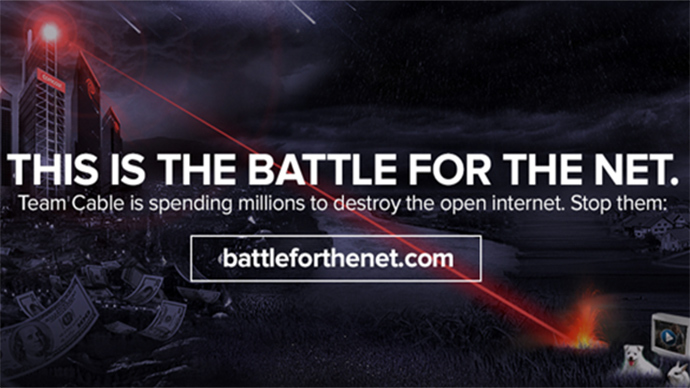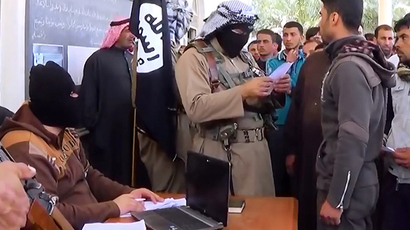Internet Slowdown Day: Leading web companies fight for ‘net neutrality’

Reddit, Netflix, Foursquare, Mozilla, Vimeo, and Wordpress are backing the ‘Internet Slowdown’ protest against proposed US regulations that would segregate internet surfing speeds and kill “net neutrality.”
The September 10 protest features a revolving icon – symbolizing slow connectivity – illustrating how losing net neutrality would harm websites and other online services.
The US Federal Communications Commission (FCC) aims to introduce changes in existing rules allowing cable giants like AT&T, Comcast and Verizon to operate a two-tiered internet, with “slow lanes” for most internet companies, and “fast lanes” for those willing to pay more.
If you hate this symbol, join Netflix and defend #NetNeutrality on Sept. 10th: https://t.co/UOlKUgiJQjhttp://t.co/CWHMuOnWOO
— Netflix US (@netflix) September 8, 2014
Netflix, for example, relies on fast internet streams to offer users HD movies and is at the frontline of the ‘Fight for the Future’ movement, united under the #NetNeutrality hashtag.
At midnight it begins: #InternetSlowdown - Learn more: http://t.co/yVGYwAdLYv#NetNeutrality
— Free Press (@freepress) September 10, 2014
The companies taking a stand are displaying the loading symbol and urging their users to submit comments to the Federal Communications Commission, Congress and the White House.
“Not to worry, the icon you are seeing today will not actually slow down your internet service. But it is there to warn Web visitors of what world's cyberspace could be like if Internet Service Providers (ISPs) were allowed to charge more for faster access,” Fight for the Future explained in their call to action.
Our friends @fightfortheftr want you to #occupy the #InternetSlowdown: http://t.co/g7r9eZ4of8pic.twitter.com/r5UrTcpEb6
— Occupy Wall Street (@OccupyWallStNYC) September 9, 2014
Consumer-privacy expert and eHOw tech columnist Liz McIntyre told RT.
“The FCC would like to roll back Title II protections for the
internet, which means that they see a world in which the internet
is no longer a wonderful playing field where everyone has a
voice. By rolling this back, they would put the power over the
internet into the hands of a very small group of very, very
powerful people, namely the telecommunication companies.”
“The vision is that once Title II protections are no longer
there then it will be up to the organizations in charge to decide
exactly who gets what service and how fast that service will
be,” McIntyre added.
With the open comment period due to end on September 15, the FCC
is expected to issue a final rule as soon as yearend. The new
guidelines aim to replace the FCC's 2010 open internet order,
struck down by a federal appeals court in January this year.
“Net neutrality” debates focuses on how two-tier traffic
would impact competition, consumers, free speech and civic
engagement.
More protests are planned to remind the FCC that the internet is a “common carrier”, including rallies in New York, Philadelphia and Washington, DC, on September 15-18.














